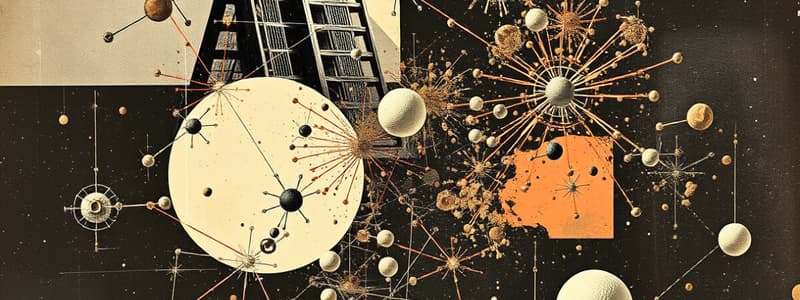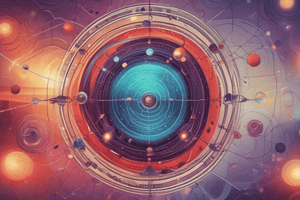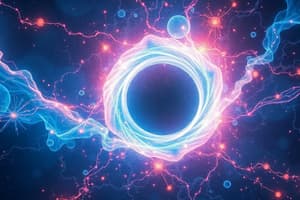Podcast
Questions and Answers
What is matter?
What is matter?
- Electrically charged atoms
- A fixed position of atoms relative to each other
- Anything that has a mass and takes up space (correct)
- Particles with a positive charge
What are the smallest parts of matter?
What are the smallest parts of matter?
Atoms
What are protons?
What are protons?
Particles with a positive charge.
What are neutrons?
What are neutrons?
What are electrons?
What are electrons?
What is an atomic number?
What is an atomic number?
What is mass number?
What is mass number?
What is an isotope?
What is an isotope?
What is a compound?
What is a compound?
What is a bond?
What is a bond?
What is a covalent bond?
What is a covalent bond?
What are ionic bonds?
What are ionic bonds?
What are ions?
What are ions?
What is a mixture?
What is a mixture?
What is a heterogeneous mixture?
What is a heterogeneous mixture?
What is a homogeneous mixture?
What is a homogeneous mixture?
What is density?
What is density?
What are solids?
What are solids?
What are liquids?
What are liquids?
What are gases?
What are gases?
Flashcards are hidden until you start studying
Study Notes
Matter
- Matter consists of anything that possesses mass and occupies space.
- Composed of minuscule particles known as atoms.
Atoms
- Atoms represent the fundamental building blocks of matter.
- They are the smallest indivisible units of matter.
Protons
- Protons are positively charged particles found within an atom's nucleus.
Neutrons
- Neutrons are neutral particles that carry no electric charge.
Electrons
- Electrons are negatively charged particles that orbit around the nucleus of an atom.
Atomic Number
- Defined as the total count of protons in an atom's nucleus, which also equals the number of electrons in the outer electron cloud.
Mass Number
- The mass number refers to the sum of protons and neutrons in an atom's nucleus.
- For example, oxygen has a mass number of 16.
Isotope
- Isotopes are variants of the same element that have differing numbers of neutrons.
Compound
- Compounds are formed when atoms of two or more different elements chemically bond together.
Bond
- Bonds are the attractive forces that hold atoms together within compounds.
Covalent Bond
- Covalent bonds are formed through the sharing of electrons between atoms.
Ionic Bonds
- Ionic bonds occur when atoms combine by transferring charges, resulting in positively or negatively charged ions.
Ions
- Ions are atoms that carry an electric charge due to the loss or gain of electrons.
Mixture
- A mixture consists of two or more substances that are not chemically combined, allowing for separation.
Heterogeneous Mixture
- In a heterogeneous mixture, the components are not uniformly distributed, exemplified by a salad.
Homogeneous Mixture
- Also known as solutions, homogeneous mixtures exhibit uniform composition throughout, making individual components invisible.
Density
- Density is defined as mass divided by volume, with its measurement expressed in grams per cm³.
Solids
- In solids, atoms are fixed in place relative to one another, maintaining a rigid structure.
Liquids
- In liquids, atoms are attracted to each other but can move and change positions, allowing for a flowing nature.
Gases
- In gases, atoms experience minimal attractive forces, enabling them to move freely and expand to fill their container.
Plasma
- Plasma is a state of matter that is composed of charged particles but requires further definition.
Studying That Suits You
Use AI to generate personalized quizzes and flashcards to suit your learning preferences.




